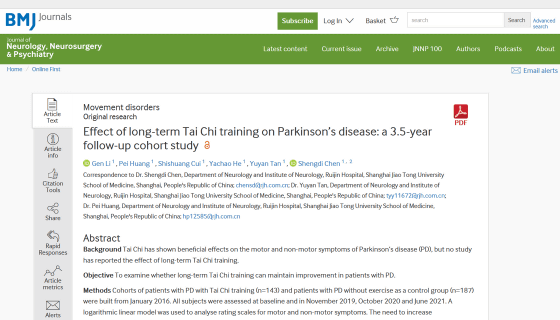Tai Chi may ease Parkinson's symptoms

Effect of long-term Tai Chi training on Parkinson's disease: a 3.5-year follow-up cohort study | Journal of Neurology, Neurosurgery & Psychiatry
https://jnnp.bmj.com/content/early/2023/09/27/jnnp-2022-330967

Parkinson's disease: tai chi may help manage symptoms – new research
https://theconversation.com/parkinsons-disease-tai-chi-may-help-manage-symptoms-new-research-216376
Tai Chi is known to have many health benefits, including improved balance , reduced risk of cardiovascular disease , and reduced anxiety . It has also been reported that tai chi can help relieve symptoms of Parkinson's disease, but previous studies were short-term and the long-term effects of tai chi on Parkinson's symptoms were unknown. .
Therefore, a Chinese research team recruited patients with sporadic Parkinson's disease, which is not hereditary, and excluded patients with health problems that prevented them from attending tai chi classes, for a total of 330 patients. The we. The average age of the subjects was 66 years old, and all were in the early stages of Parkinson's disease at the time of participation. Of these, 143 were assigned to the experimental group, which received tai chi training, and the remaining 187 were assigned to the control group, which did not receive tai chi training.
Patients in the experimental group took five tai chi classes from 2016 to 2018 and were instructed to complete 1 hour of tai chi training twice a week. The research team then tracked all subjects from 2019 to 2021 and evaluated them for symptoms of Parkinson's disease.
The results showed that patients in the experimental group who practiced tai chi maintained better motor function at the end of the study compared to the control group. On the other hand, in the control group, motor functions such as walking ability and sense of balance deteriorated more quickly, and it was necessary to take more drugs to suppress the symptoms of Parkinson's disease during the research process. This suggests that the symptoms of Parkinson's disease progressed more quickly in the control group, or that Tai Chi was effective in slowing the progression of symptoms.
It was also reported that patients who practiced Tai Chi performed better than patients in the control group in various aspects such as quality of life, happiness, sleep, memory, and thinking.
Therapeutic drugs for Parkinson's disease are only used to improve daily life activities and prolong the prognosis; there is no fundamental treatment. Therefore, it may be beneficial for patients to incorporate familiar and effective exercise therapy such as Tai Chi.
However, the groups in this study were not randomized, and the experimental and control groups may have differed in their motivation to exercise or other lifestyle factors. Therefore, the research team recommends randomization in future large-scale follow-up studies to prevent bias.
At the time of writing, the exact mechanism by which Tai Chi relieves Parkinson's symptoms is also unknown, but studies suggest that lack of exercise

Related Posts:
in Science, Posted by log1h_ik







